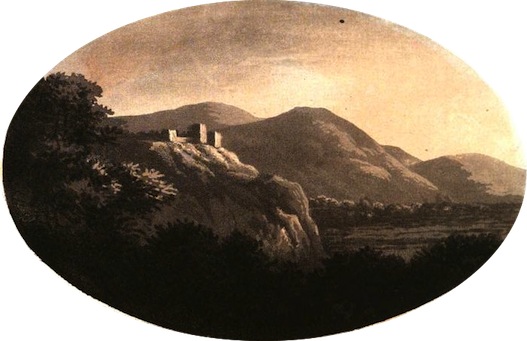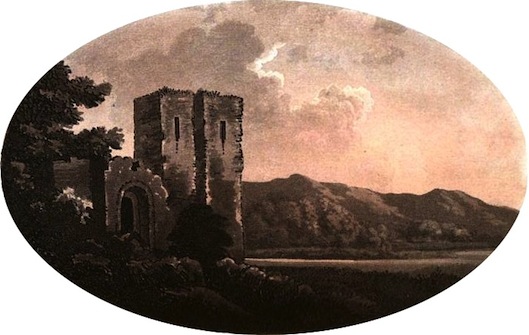Llandeilo to Neath
Next Selection Previous Selection
FROM Dinevawr-castle we set out across the country for Neath; a good turnpike-road, we were assured, would lead us thither, but we were told much of the difficulty of passing the mountain
, as they emphatically call a ridge of high ground which lay before us. Though we had left the vale of Towy, the country continued to wear the same face of hill and dale which it had so long worn. On the right, we had still a distant view of the scenery of Dinevawr-castle, which appeared like a grand woody bank. The woods also of Golden-grove-castle, varied the scene. Soon after, other castles, seated loftily on rising grounds, adorned other vales; Truslan-castle on the right, and Caerkennel on the left. But all these beautiful scenes by degrees were closed; castles, and winding rivers, and woody banks were left behind, one after another, and we approached nearer and nearer the tremendous mountain; which spread its dark mantle athwart the view. It did not however approach precipitately; though it had long blotted out all distance, yet its environs afforded a present scene, and partook of the beautiful country we had passed. The ground about its foot was agreeably disposed, swelling into a variety of little knolls covered with oak, which a foaming rivulet, winding along, shaped into tufted islands and peninsulas of different forms, wearing away the foil in some parts from the roots of the trees, and in others delving deep channels; while the mountain afforded a dark solemn back-ground to the whole. At length we began to ascend; but before we had risen too high, we turned round to take a retrospect of all the rich scenes together, which we had left behind. It was a noble view, distance melting into distance, till the whole was closed by a semicircle of azure mountains, mountains, scarcely distinguishable from the sky which absorbed them. Still ascending the spiral road round the shaggy side of the mountain, we arrived at what is called its gate
. Here all idea of cultivation ceased. That was not deplorable; but with it our turnpike-road ceased also; which was finished on this side, no farther than the mountain-gate
. We had gotten a guide however to conduct us over the pathless desert. But it being too steep and rugged to ascend on wheels, we were obliged to lighten our carriage, and ascend on foot. In the midst of our labour, our guide called out that he saw a storm coming on along the tops of the mountains, a circumstance indeed which in these hilly countries cannot often be avoided. We asked him, How far it was off? He answered, Ten minutes. In less time, sky, mountains, and vallies were all wrapt in one cloud of driving rain and obscurity. Our recompence consisted in following with our eye the rear of the storm; observing through its broken skirts a thousand beautiful effects and half-formed images, which were continually opening, lost, and varying, till the sun breaking out, the whole resplendent landscape appeared again with double radiance, under the leaden gloom of the retiring tempest. When we arrived at the top of the mountain, we found a level plain, which continued at least two miles. It was a noble terrace; but was too widely spread to give us a display of much distant scenery. At length we began to descend the mountain, and soon met an excellent turnpike-road, down which we slid swiftly, in an elegant spiral, and found, when we came to the bottom, that we had spent near four hours in surmounting this great obstruction. Having thus passed the mount Cenis of this country, we fell into the same kind of beautiful scenery on this side of it which we had lest on the other: only here the scene was continually shifting, as if by magical interposition. We were first presented with a view of a deep woody glen lying below us, which the eye could not penetrate, resting only on the tops and tuftings of the trees. This suddenly vanished, and a grand rocky bank arose in front, richly adorned with wood. It was instantly gone, and we were shut up in a close woody lane. In a moment, the lane opened on the right, and we had a view of an enchanting vale. We caught its beauties as a vision only. In an instant they fled, and in their room arose two bold woody promontories. We could just discover between them, as they floated past, a creek, or the mouth of a river, or a channel of the sea. We knew not what it was; but it seemed divided by a stretch of land of dingy hue, which appeared like a sand-back. This scene shifting, immediately arose, on our left, a vast hill, covered with wood; through which, here and there, projected huge masses of rock. In a few moments it vanished, and a grove of trees suddenly shot up in its room. But before we could even discover of what species they were, the rocky hill, which had just appeared on the left, winding rapidly round, presented itself full in front. It had now acquired a more tremendous form. The wood, which had before hid its terrors, was now gone; and the rocks were all left, in their native wildness, everywhere bursting from the soil. Many of the objects which had floated so rapidly past us, if we could have examined them, would have given us sublime and beautiful hints in landscape; some of them seemed even well combined, and ready prepared for the pencil; but, in so quick a succession, one blotted out another; and it would have been endless to stop our chaise and examine them all. The country at length giving way on both sides, a view opened, which suffered the eye to rest upon it. The river Neath, covered with shipping, was spread before us. Its banks were enriched with wood, amidst which arose the ruins of Neath-abbey, with its double tower. Beyond the river the country arose in hills, which were happily adorned, when we saw them in a clear serene evening, with one or two of those distant forges or charcoal-pits, which we admired on the banks of the Wye, wreathing a light veil of smoke along their summits, and blending them with the sky.—Through this landscape we entered the town of Neath, which with its old castle, and bridges, excited many picturesque ideas.
SECTION IX.

William Gilpin, Observations of the River Wye, and several parts of South Wales (London: Cadell Junior and W. Davies, 1800) Conversion to HTML and placename mark-up by Humphrey Southall, 2012.

